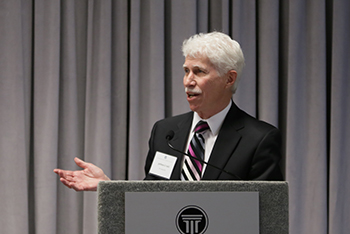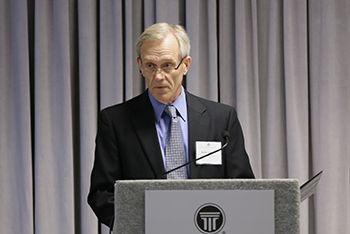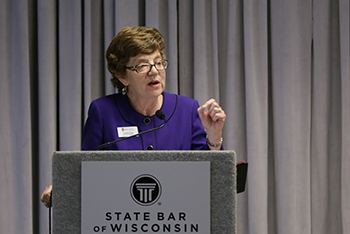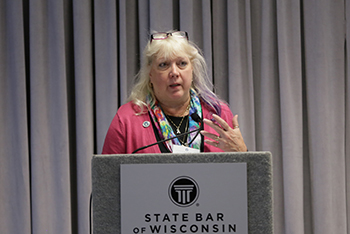
Jim Gramling, on behalf of the Legal Assistance Committee, asks for the board's support of a petition to allow lawyers to claim CLE credit for certain pro bono services and to clarify that registered in-house counsel may provide pro bono services.
April 24, 2015 – The State Bar of Wisconsin’s Board of Governors supports a petition that would allow Wisconsin attorneys to obtain continuing legal education (CLE) credit for doing pro bono work to foster practical learning and increase pro bono service.
At its meeting in Madison today, the 52-member board unanimously approved a petition developed by the State Bar’s Legal Assistance Committee – in consultation with the CLE Committee – allowing attorneys to claim one CLE credit for every five hours of qualifying pro bono service, up to a maximum of six credits per reporting period.
Attorney James Gramling, a member of the Legal Assistance Committee and president of Wisconsin’s Access to Justice Commission, appeared to urge support. The petition will now be filed with the Wisconsin Supreme Court requesting rule changes.
Gramling said increasing pro bono service is a big part of the State Bar’s strategic plan, and this measure has the potential to greatly increase pro bono service in Wisconsin. “This has been vetted for years, frankly. It’s time to act on it,” he said.
In addition, the petition also allows in-house counsel to perform pro bono work in Wisconsin, even if they are not admitted to practice law in Wisconsin, so long as they are registered as in-house counsel under SCR 10.03(f). Comments to the current rules suggest in-house counsel may do pro bono work, but the rules don’t expressly allow it.
The Legal Assistance Committee developed the petition, noting the unmet civil legal needs of many Wisconsin citizens and the perennial underfunding of legal aid agencies that provide primary pro bono services.
Board Discusses Petition on OLR Discretion
Keith Sellen, director of the Office of Lawyer Regulation, appeared to request State Bar support for a petition (14-06) that would give the OLR more discretion in lawyer disciplinary cases involving allegations of de minimus violations.

Office of Lawyer regulation Director Keith Sellen speaks to board about the OLR's petition to provide e-banking procedures for lawyer trust accounts. The board unanimously supports the proposal.
“This would result in OLR and the preliminary review committee exercising significantly more discretion in these minor cases than we do now,” Sellen said.
“Many grievances that currently result in private reprimands and diversion agreements would likely be closed or dismissed either at intake or after the formal investigation.”
Currently, the OLR must investigate and pursue discipline even where the violation is de minimus. More discretion would allow the OLR to dispose of minor cases earlier. The board could consider whether to support the petition, filed in 2014, at its next meeting.
Board Takes Policy Position Law School Student Loan Debt
The board adopted a policy position on student loan debt and its impact on new lawyers, allowing State Bar lobbyists to work on state and federal legislation to provide loan forgiveness or debt payment assistance that could ease debt burdens for lawyers.
The State Bar’s Policy Committee consulted with the Challenges Facing New Lawyers Committee, appointed by immediate Past President Patrick J. Fiedler in 2014, to recommend the following policy position that was adopted by the board today:
"Despite their deep commitment to ensure access to justice for all citizens, many find that the rising cost of a legal education forces them to forego any form of public service or to practice in fields or settings that result in substantially lower loan repayment opportunities. The State Bar of Wisconsin supports legislative efforts to reduce the cost of a legal education and to provide loan repayment assistance programs (LRAP) where appropriate."
In addition, the board voted to alter an existing policy position related to the Wisconsin Supreme Court’s superintending authority over all courts in Wisconsin.
The new position states the State Bar “opposes efforts that would usurp the superintending authority of the Court,” a change deemed necessary to provide greater flexibility in addressing legislation and issues that arise during the state budget process.
The previous position was specific to the court’s authority to determine the support agencies, structures, and services needed to maintain its independence and effectiveness as a separate branch of government.
The board also voted to sunset a policy that supported recommendations in a 2007 report by the Wisconsin Access to Justice Commission.
The Policy Committee noted that many of the recommendations in the report are already captured by other State Bar policy positions or have been implemented.
Board Supports OLR’s Petition on E-banking for Trust Accounts
The board voted to support a petition (14-06) that would allow electronic banking transactions to and from attorneys’ trust accounts through new procedures and record-keeping requirements. The Office of Lawyer Regulation (OLR) filed the petition last December. The Wisconsin Supreme Court has not yet scheduled the petition for review.
OLR Director Keith Sellen appeared at the board’s February meeting to discuss the petition, noting the increasing use of electronic transactions in banking procedures.
He said the proposed rule would modernize the trust account rules and enable lawyers to better serve the public while allowing the OLR to adequately protect the public.
Board Adopts FY 2016 Budget
The Board approved an $11.98 million budget for fiscal year 2016 (July 1, 2015 to June 30, 2016), less than a 1 percent increase to the budget approved for FY 2015. The approved budget does not change the membership dues structure or the dues rate.
Board Adopts New Strategic Planning Process
The board adopted a new process to develop and implement the State Bar’s strategic plan, which establishes priorities, goals, and expectations that are supported by volunteer leadership, members, and staff. The strategic plan serves as a concrete map for fulfilling the State Bar’s mission and for making budget and operational decisions while providing measurable targets to promote management and board accountability.
The new process will allow the State Bar to develop a new strategic plan every four years through a four-year cycle that starts with collecting stakeholder input and gathering information on trends and challenges before review and implementation.
Lisa Lawless, Strategic Planning Committee chair, said the previous planning process forced the committee to spend a majority of time rating the annual plans of committees, divisions, and programs, with less time on actual strategic planning.
“This is a less cumbersome process that moves from the bottom up,” Lawless said. “The new process allows the committee to think big picture on a four-year cycle.”
Board Discusses Ultimate Pass Pricing
Attorney Gretchen Viney, former State Bar CLE Committee chair, addressed the board regarding pricing concerns with the State Bar’s Ultimate Pass, which grants access to a package of CLE programs produced by State Bar of Wisconsin PINNACLE™.

Attorney Gretchen Viney, former chair of the CLE Committee, addresses the Board regarding concerns about the Ultimate Pass.
The Ultimate Pass Silver and Ultimate Pass Gold are one-year subscriptions that give subscribers tuition-free access to attend PINNACLE events, including live in-person seminars, webcasts, webcast replays, OnDemand webcasts, and telephone seminars.
Gold subscribers also get a 100 percent discount on single- or multi-day conferences and Institutes – including the Wisconsin Solo and Small Firm Conference -- while Silver subscribers receive a 50 percent discount on those events. Ultimate Pass holders also have access to all CLE course materials in the OnDemand library.
Ultimate Pass Silver subscribers pay $899 per year currently. Ultimate Pass Gold subscribers pay $1,099 per year. Viney argued that the Ultimate Pass subscriptions are no longer affordable for members, noting price increases since product launch in 2008.
Viney said the Ultimate Pass was originally intended to give subscribers access to all CLE course materials for an affordable price.
“We created the Ultimate Pass as a member benefit so that lawyers could access existing State Bar CLE seminar materials,” Viney said. “The initial purpose of the program was to provide lawyers, especially but not exclusively low-income lawyers, with a reasonably priced way to access already existing State Bar seminar resources.”
In 2008, the product launched with a subscription rate of $595, but did not include free or discounted tuition at conferences or institutes. Viney said the original price reflected the State Bar’s desire to open access once a lawyer paid for two to three seminars.
Viney said current pricing is out of reach. “This member benefit has somehow morphed into a product that is priced too high, and it cannot help but exclude the very members who need it,” said Viney, who wants the Ultimate Pass to be restored to its 2008 form.
CLE Committee Chair Kathryn Bullon, who was on the CLE Committee when the Ultimate Pass launched in 2008, said the Ultimate Pass is both a member benefit – by providing major discounts for members who use it – and a revenue-generating product.

Current CLE Committee Chair Kathryn Bullon addresses the Board regarding Ultimate Pass.
Bullon said the average Ultimate Pass subscriber accesses seven seminars per annual pass, at a value of about $1,500. She said the Silver pass, at $899, is most similar to the Ultimate Pass as launched in 2008, but subscribers now have twice the offerings.
“The average pass holder pays for three seminars and accesses seven. It’s still a member benefit to a significant extent,” said Bullon, noting the Ultimate Pass holders could access 30 seminars at same cost. “We have pass holders who do that.”
Bullon also said Ultimate Pass price changes reflect increased offerings and market value per program, as well as the State Bar’s goal to make PINNACLE self-sustaining.
She suggested that lowering the cost of Ultimate Pass subscriptions may require an increase in dues, since PINNACLE’s bottom line is tied to the products it sells. For every $200 decrease, Bullon said, the State Bar would have to raise dues by $10.
“We have looked at this very carefully, and very hard,” said Bullon, noting that PINNACLE is mandated by bylaw to be “fiscally responsible,” i.e., not operate at a loss. “This is as revenue-neutral as we can make it without losing our shirts.”
District 9 Gov. Chris Rogers, also a member of the CLE Committee, noted that the product launched seven years ago, and inflation has impacted Ultimate Pass pricing since then. Governors Margaret Hickey and Tom Schwaba wondered whether pricing could be reduced for young lawyers who are just starting out. A discussion item, the board took no action but could revisit the issue at a subsequent meeting.
Other Business
The board approved requests to amend the bylaws for the Bankruptcy, Insolvency, and Creditors’ Rights, the Environmental Law, and the Taxation sections, and approved the requests of various sections to carryover more than $10,000 in their operating budgets for the next fiscal year.
The board also voted to change the dates of the 2019 Annual Meeting and Conference. It will be held June 19-21, 2019, at the Wilderness Resort in Wisconsin Dells.
Upon request, interested members may obtain a copy of the minutes of each meeting of the Board of Governors. For more information, contact State Bar Executive Coordinator Jan Marks by email or by phone at (608) 250-6106.
